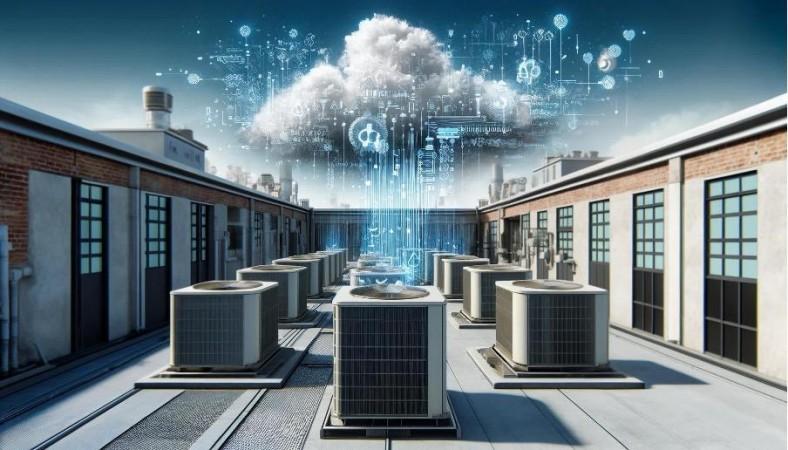
Monaire is a company that aims to help the world transition to more sustainable heating, ventilation, and air conditioning (HVAC) systems. To that end, Monaire chief technology officer (CTO) and co-founder Rahul Subramany points out how artificial intelligence (AI) in smarter HVAC systems can be so much more.
The Escalating Climate Crisis and HVAC's Role
As global temperatures continue to rise at an alarming rate, the risks of natural disasters that threaten human life and well-being are becoming increasingly apparent. The need for sustainable solutions to mitigate the impact of climate change has never been more pressing, with the last decade being notable as the hottest on record.
"Ironically, as the world warms, we are increasing our use of cooling systems to maintain comfort," Subramany remarks. "This is not sustainable." Subramany has a proven track record of developing innovative solutions to tackle the global warming problem.
Through his company, he is continuously demonstrating how artificial intelligence (AI) has the potential to improve the overall efficiency of HVAC systems and reduce their environmental impact. Monaire is a company that aims to actively contribute to the HVAC industry.
His early experiences growing up in rural southern India shaped his understanding of the need for sustainable energy solutions. During summer months, frequent blackouts occurred due to the predominantly hydroelectric grid's inability to meet demand.
The Environmental Impact of HVAC Systems
HVAC systems are responsible for around 15% of global greenhouse gas emissions from fuel combustion, according to the International Energy Agency (IEA). An estimated additional 10% of emissions stem from food loss and waste due to lack of refrigeration, according to a report by the United Nations Environment Programme (UNEP).
The demand for cooling is increasing rapidly as global temperatures rise. The IEA projects that if left unchecked, HVAC systems could account for a staggering 25% of global CO2 emissions by 2030, presenting a monumental sustainability challenge.
"A global effort is needed to transition the world towards more sustainable heating and cooling solutions to cut emissions," asserts Subramany. The investment and effort required for this transition are often prohibitive for most buildings, except high-end properties like Class A office towers.
Monaire's AI-Driven Approach to Sustainable HVAC
This is where Monaire steps in, utilizing AI to accelerate the transition towards sustainable heating and cooling without requiring immense capital deployment. Monaire's technique enhances existing HVAC systems rather than replacing them entirely. Monaire uses HVAC manufacturer data to construct a 'digital twin' of an HVAC system, establishing a benchmark for optimal performance.
Monaire's AI-driven platform employs sophisticated algorithms and machine learning to scrutinize real-time data from wireless sensors installed on HVAC equipment, pinpointing deviations from ideal performance.
This enables predictive maintenance, identifying potential issues before they lead to system failures or inefficiencies. Monaire's solution can reduce energy consumption by up to 30% by continuously monitoring and optimizing HVAC performance and cutting repair costs by 30%.
"We use AI to continuously monitor and improve HVAC system performance, cutting waste and detecting issues before failure to avoid food spoilage," explains Subramany. "We see to it that units always run at peak efficiency by fixing issues earlier. That subsequently reduces energy consumption and emissions."
Monaire's Early Success and Future Vision
The potential impact of Monaire's AI-driven solutions doesn't come unnoticed in the industry. The global HVAC systems market is projected to reach a staggering $310.2 billion by the end of the decade. This rapid market expansion aligns with Monaire's mission to accelerate the global transition to sustainable heating and cooling.
"We have been established in around 150 locations in Wisconsin since March 2023," Subramany shares, highlighting the early success of the company's outlook. "We achieved this growth purely via referrals. We haven't spent any money on marketing to date."
"This early traction demonstrates the market's readiness for AI-driven solutions that can deliver significant energy savings and reduce environmental impact."
Monaire's AI-powered HVAC optimization has already shown impressive results in various case studies. For example, Caspian Grill, a Mediterranean restaurant in Madison, Wisconsin, saw a 28% reduction in their HVAC energy costs and a 75% reduction in equipment downtime after implementing Monaire's solution.
Subramany envisions a future where AI-driven solutions like Monaire's become the norm rather than the exception. At the same time, Monaire continues to expand its reach, with plans to enter new markets in the next 12 months.
"Our goal is to optimize HVAC and Refrigeration systems as much as possible," he explains. "For example, our technology digitizes legacy HVAC systems and enables us to provide grid services such as demand response. This enables more renewable energy sources to operate in our electricity grids." He emphasizes the long-term vision of making heating and cooling more sustainable worldwide.
The path to a more sustainable future is not without its challenges, but innovative companies like Monaire are paving the way for AI to play a crucial role in combating climate change. Monaire is helping building operators save on energy costs, reduce their carbon footprint, and contribute to a global effort to mitigate climate change's impact through advanced technologies.
The vision of a more sustainable future becomes increasingly attainable as more businesses and building operators embrace these innovative technologies. Companies like Monaire, with the projected growth of the HVAC systems market and the increasing adoption of AI-enabled solutions, have the potential to impact the fight against climate change significantly.

















